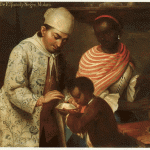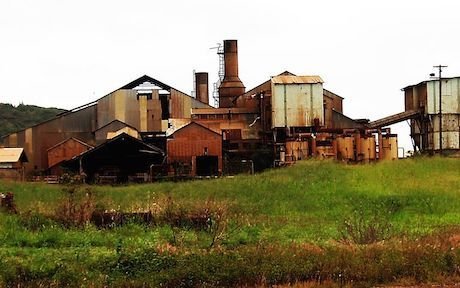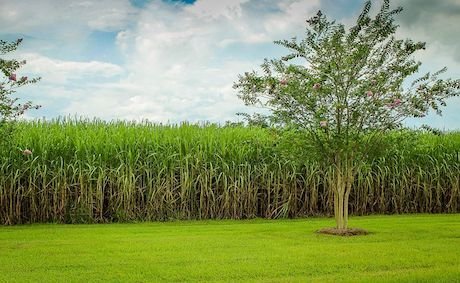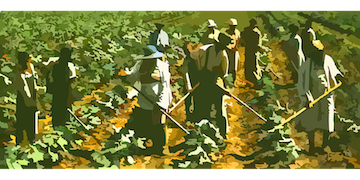The First Taste
I stopped eating refined sugar because it gives me migraines and I get fat. I started researching why I have such a negative reaction and discovered the dark history of sugar. This article is written to set up another article I will be writing about that deals with the addictive nature of sugar and how it affects our body and mind.

Sugar And Slavery
Growing sugar now as in the past takes a lot of energy. When Arabs discovered sugar in the Seventh century, they used imported slaves from East Africa and Europe, transforming the areas they conquered through agriculturally methods unknown to the natives.
By the fifteenth century, Portugal and Spain sent ships further south along the African coast, selling and trading slaves. The native people were captured and enslaved for use on sugar plantations from Madera, the Azores, the Cape Verde Islands, Sao tome, Principe and Annobon, and the Canary Islands.

Columbus introduced sugarcane from the Canary Islands to the Americas along with the Western Worlds infectious diseases and colonization methods. His second voyage in 1493 brought plantings and expert farmers to plant the fields of Hispaniola, which as we know the land now, Haiti and the Dominican Republic. It is said the sugarcane started growing within seven days. However the farmers and the Amerindian slaves used for labor died. Working conditions were extreme in the cane fields. The heat, poor diet, long and arduous work hours set up conditions for newly introduced European infectious disease to wreck havoc on traumatized underfed natives.
Ten years later the Canary Island sugarcane was reintroduced to Hispaniola through a different method. Anyone who could build a sugar mill would be given 500 pieces of eight in gold given as a loan. It only took ten years to produce loaves of sugar for Spain, by 1525 the trade became so profitable that sugar was shipped with pearls and other precious cargo under guard by the Spanish Emperors Convoys.Brazil was colonized because of sugar. Pinzon, Columbus’s pilot brought sugar to Brazil in 1499 along with Portuguese colonists developed the New Worlds sugar industry. Sugar was refined and sent back to Portugal by 1526, making sugar the first agricultural product to be commercialized. By the end of the sixteenth century sugar mills spread throughout the land and Brazil was shipping over ten thousand, maybe tens of thousands of pounds of sugar to Europe each year.

The Spanish conquistadors brought sugar to Mexico by the early sixteenth century. Sugar mills spread here as well along with colonization and slavery. The Aztec Empire was brought down by war, European disease, and sugar plantation slavery. Gonzalo Fernandez de Oviedo published his history conquering Mexico he speculated that Mexico’s budding sugar production could supply all of Christendom. Along with sugar a trade was developed from native foods and drinks, like cocoa. The natives made a drink from cocoa and spicy chilis. The Europeans preferred sugar mixed with cocoa and became addicted to sweet chocolate. However, only the rich could afford sugar or chocolate.

The cultivation of sugar and the milling process was labor and energy intensive. Slaves were needed for the fields and the mills. However, forced labor and diseases brought from Africa and Europe killed off the native population that had been forced into slavery. This is when African slaves, European criminals and indentured were introduced to the New World to work the Sugarcane fields and Mills. African slaves were very expensive and hardier when compared to the cheap labor of native populations and European indentured servants and criminals.

The French and British began colonizing the Caribbean in the seventeenth century finding the sugar business lucrative, however the plantations were labor intensive. They found a large population of poor people in Europe who were willing to work or forced to work and wold contract their services for 1 to five years to pay off debts, avoid prison, or pay for a trip to the Colonies. If one was caught stealing a loaf of bread or was caught in any minor infraction they were shipped off to the sugarcane plantations. Millions of poor Europeans, Indigenous people of the America’s and African people died working the cane fields. Poor food, backbreaking labor and infectious diseases killed millions of people enslaved for the production of sugar. Indentured servants had a contract with a plantation owner. They were said to have more freedom than a slave but that depended on the honesty of those who held their contract. Most plantation owners didn’t honor their contracts. Often the Indentured servant died before their contract was up saving the plantation owner money and or land. Many times the indentured servants were forced to keep on working because of debts or threats of death.

Jamestown Virginia in1607 tried growing sugar, however the climate was too harsh for sugarcane, which needs year round tropical conditions to grow. The British were able to grow sugar in Barbados in the 1640s and later in Jamaica. However, the British needed help from the Dutch who had become experts and growing and refining sugarcane. The number of slaves on Barbados and later Jamaica went from a few thousand to near 46 thousand by 1683. By the 1830s British Christian emancipationist put an end to the slave trade. The slave trade continued shipping their cargo to the New World and it is thought that nearly two-thirds died growing and refining sugar. The plantation slaves were a mix of African slaves, indentured Europeans, native Americans and criminals from throughout the European colonies.

The Sugar Industry of the seventeenth through the nineteenth century was like our oil industry today. The power and wealth made from sugar created vast wealth and political power. Wars were fought, fortunes were made and lost over sugar. White gold was a fifth of all British imports, five times more profitable than tobacco. The taxes gathered by the British and American governments were enormous and both governments became sugar addicts. It was easy to tax sugar plantations which were isolated tropical colonies that could be controlled. The demand for sugar was endless and growing, which helped America’s new government grow in strength after the Revolution.
The Caribbean Islands grew only sugarcane because it had become so profitable. While the American colonies provided Europe with food and hemp for rope and cloth production. Growing Hemp was legal and productive! This is the reason why the British West India Company back in the 1660s tried to take New Amsterdam, now New York from the Dutch because they needed a port on Americas mainland to trade sugar and molasses for slaves and food. The Dutch made a bargain with the British for New York in exchange for the Dutch Guiana, now called Suriname, which was used for growing huge amounts of sugarcane.

Around the 1790s America finally started growing sugarcane in Louisiana, the sugar refineries were up and running processing molasses from the Caribbean into refined sugar. Sugar mills were popping up all over the Northwest coast and by 1810 over 33 refineries were operating, by 1860 New York had 18 of its own.
When we look at the wealthy families of New York they began as sugar refiners, confectioners, and the middleman in the slave trade which also transported sugar and molasses and rum to Africa. On the way back they would bring slaves, foodstuffs back to the Caribbean Plantation owners. The Caribbean plantation owners only produced sugar they need the basic necessities from the New World to survive.
One of the reasons America rebelled against the Britain was because of taxes on molasses. However, rebellion isn’t bred on just one thing, all natural human freedoms were being infringed upon by an overreaching greedy monarchy.
To Be Continued, I will be going into the addictive nature of sugar and how it causes mental and physical illness.
Caribbean Irish Indentured Servitude
Portuguese trading stations in West Africa and the slave trade
This essay explores the creation of an Atlantic economy based on sugar and slaves. It details the ways in which labor-intensive and lucrative sugar production led to a marked rise in the demand for slaves from Africa after the seventeenth century. In addition to focusing on the economic aspects of the sugar/slave system, this essay also examines the human experience of the slave trade, its effects on African communities, and the ways it was resisted. Pictures From Pixabay


 A link to My Blog
A link to My Blog
Morocco also has a share in the cultivation of sugar cane and this is a Moroccan product
Photos taken from my store
I read Morocco has a large sugar industry, your sugar history is ancient.
Yes , here in morocco we use sugar with everything ( tea,coffee,juice,bread,cake,..) and that is not healthy .
I know it's not healthy, I get horrible sick if I eat sugar, especially late at night!
Heavy sugar intake caused the rats to develop a resistance to insulin — a hormone that controls blood sugar levels and also regulates the function of brain cells.
I will be writing about this @markzukerbergs, we haven't evolved to eat so much refined carbs and the chemicals that are used to make our over refined dead food taste good.
Great article. Some of this was covered in the book Sugar Blues by William Dufty. He approaches it from more of a health angle. The biggest thing I got from his book is that refined sugar causes cancer. And thanks again from both me and Kayla for your help- it means a lot!!!
I wish I could hug Kayla and you are all in my prayers. I have the book Sugar Blues and several others I will use for reference when I write my next article on how bad sugar is for our health and how much energy/resources it uses in production. I had no idea about sugar and slavery!
I'll give her a big hug for you! I'm going over to see them on Sunday and see if they need anything. My ex works her butt off and doesn't make very much, so I try to help out... I have to fight her to make her take money, but she needs it more than I do.
I had a sneaking suspicion that you knew about Sugar Blues... I read it in 2010 and it changed my life. I almost cut out sugar, but still wound up with diabetes. I take Berberine and in a month and a half my blood sugar hasn't been over 148. When I use sugar I get raw, it's good- it actually has flavor! Thanks again for everything- especially your friendship!!!
Sugar and salt. It's the first money changer in history. Thanks for sharing. My precious friend @reddust
My education on history through public schooling has been limited....OMG, I am learning so much with the internet wide open and I can order any book I can find. Thank you @turkishcrew
Good one! I think the slavery is still here if you think about all fast and packed food. I have given all kind of sugar for 3 months and it was the healthiest times in my life. And in that time I couldn't find to buy anything on the supermarket because of even the mushroom soup has a lot of sugar! I couldn't carry on because of my busy work hours but definitely will do again soon. So I think I'm still a slave at one point.
I've been off and on sugar since 1997, I've noticed through the years my asthma and hay fever disappeared if I stay off of sugar and refined carbs. I lost 50lbs 3 years ago getting off sugar and wheat. I found out through a my oldest daughters DNA test my family on both sides is 98 percent Western European and we have a larger than normal amount Neanderthal DNA. I read if one has a Neanderthal DNA one is prone to autoimmune disease, celiac disease, allergies to wheat and dairy and we don't process sugar very well. I found this out the hard way.
@punky you should try and get off sugar again, it only takes a few weeks to let go of the cravings. I don't eat a lot of sweet fruit, that seems to help let go of the cravings as well.
I met several Tibetan Rinpoche's that had been put in prison by the Chinese government for years. They were treated worse than slaves but retained their empathy and happiness. I think slavery is awful but what is even worse is being a slave to craving, hatred, and other negative mind states. Letting go of sugar helped my state of mind as well!
It appears that sugar has not had a sweet past unless you were a money maker from the slave labor. Today's sugar is not what the old sugar was...and over done by food makers and still addictive to many. Thanks @reddust for the interesting historical perspective.
It seems that the slave system has been refined into low wage labor tax slave system. Sugar in the past wasn't available to the common people. As industrialization became prevalent the processing of mass sugar became easier. Whether it was molasses or refined sugar, large amounts are not good for the human body and mind. Thank you @enjoywithtroy.
I read your full post about sugar addiction and slave trade...
Thanks for sharing this history...
I mostly appreciate this history...@reddust
Thank you @prince121
Welcome @reddust and i always waiting for your post
The city where I was, was the capital of sugar in Morocco ^^
I am kind of jealous you live in a land so rich in history...talking to people all over the world I crave to see the places you live. Especially the ancient religious sites.
The city where I live now was the capital of the sugarcane, and also the capital of the state , But over time they became marginalized And no longer where there is sugar, They became known as vegetables and fruits :p
I am jealous to see your post.
Your posts are very many people visit.
what is the secret .... ??
I don't know, maybe it's because of the size of my account and my reputation score. I've been on steemit for almost 18 months. I posted for almost 6 months make only a few dollars a post when SBD and SP were 10 cents American Dollars. I also was found by Curators of Curie, which help minnows that create art but they dropped me once my rep reach 60 , they really helped me. But then I started making less SBD for a long time. I slowly worked up more complicated and interesting niche posts dealing with abusive medical and science practices that a group of people really like. .
You are a great friend.
I can not do as you do. but I will try. to do the best
Anda harus menulis untuk komunitas bahasa asli Anda, saya pikir itu akan lebih mudah. Saya tahu ada komunitas indonesia yang besar disini di steemit yang sangat mendukung. Menulis dalam bahasa Anda sendiri, Anda bisa menjadi kreatif dan mengembangkan keahlian Anda dengan format dan berbagai jenis tulisan di samping gambar saja.
Anda bisa memulai beberapa kontes atau mengikuti kontes, terlibat dalam mempromosikan steemit melalui kerja komunitas.
Di indonesia memang memiliki komunitas steemit.
Tapi jujur saya bilang sama anda qurator indonesia memikir untuk temannya keluarganya dan sahabat sahabatnya . saya belum pernah qurator upvote postingan saya makanya saya selalu membuat postingan dengan bahasa inggris. Walaupun saya tidak bisa. Kalau saya buat postingan dengan bahsa indonesia. Di indonesia tidak ada yang bantu . orang luarpun tidak mau. Karena mereka gidak mengerti bahasanya
I almost never use sugar. Not that I don't like it, it's already a habit :((
My mom gave me chocolate when I was a good girl...I grew up thinking sweets were good. But I found out they are not so good for me even when I am a good girl...hahaha Thank you @sadpotato!
ohh!! super history and health food good food
Thank you @shaikatkm
a sound mind in a sound body, we have to keep fit by eating good food.
Thank you @killerkusha
all of your post is always so informative,so i regularly follow your blog. love to read it...........
Thank you @steemibu351
good food for good life..
This is true @sohan4745, this is ancient knowledge, health food is medicine.
You've created a beautiful post ... and shared some great photography .... I'm fascinated by this. Waiting for your next post.
Thank you @fazlehassan
love to read it.fabulous one
Thank you @boishakhitripty
thanks for sharing i will read the whole post soon@reddust!
Thank you @akashhasan
Really it very good article writing with history of sugar. I liked reading your sugar history. Thank you for sharing this post with us.
Thank you @jareen61
beautifull story @reddust thank you
Thank you @deybala
Nice post Man... Great to see your article. Keep it up and well done.
Thank you @tetas08
good history. love to read it.........
Thank you @harmonic
I can not explain in a word.
nice looking.
Thank you @cariglee
cool post.
wherever you are friends. I've been waiting a long time. hug
Thank you @safrijals, I've been helping a lot of people. Sorry I haven't stopped by your blog lately.
Yes, I understand.
although you do not have time to help me. help my brother @papma and @dek-jal
love to read it @reddust

Thank you @sansastark
Very good i like your post
Thank you @dek-jal
Please visit to my blog
well it will take time for me to read it couse o am not a quick reader
Sorry @azizulhassan, I tried to keep this subject simple.
I stopped consuming all sugar last year I live a ketogenic lifestyle that is you burn ketones rather then glucose (sugar) nearly immediately my brain fog vanished, I had more long standing energy rather then spikes and valleys so much more. Basically sugar is a very bad addiction as it says in the image above the rats chose sugar over cocaine. Be aware read your labels. Thanks for sharing @reddust
This is exceptionally lovely Artwork.
Thank you @mafi001
Sugar is in everything these days its amazing. I have read up about the so called 'bliss point' where scientists work out the exact amount of sugar to put in foods - its pretty sad really.
I didnt know all about the history of sugar thanks!
Im doing a 28 day sugar detox at the moment I would love any supportive words it all helps :)
https://steemit.com/health/@conradt/my-28-day-sugar-detox-why-im-quitting-sugar
I always knew that sugar had a large slavery colonization behind it. Thanks for the indepth research, I liked it!
Yes we are using sugar every hour.i know its not good for health but the question is what we shoul do ?. Either we don't use it or lower the rate of using it
i don't eat that much sugar now gave up way earlier
We spoke about this and the slave trade in class the other day. I do not think kids realize what these people had to endure - really enjoyed this info, will read it to my kids. Resteeming
such sugar is not always sweet huhhh
Great Information.not lot of people know about this.thanks for sharing.
the servants too had to go though a lot
I have had to avoid sugar since experiencing a severe mold exposure in 2015. I don’t want to become a fermented mushroom.